Psychologists have found the secret to true happiness and its not having good looks, loads of money, or even being in a romantic partnership.
Although those things may contribute to short-term dopamine hits, none of them contributed to lasting happiness or increased life satisfaction.
In this post I’ll go over the 3 types of happy lives psychologists were able to identify and the practical ways you can use positive psychology to increase life satisfaction.
Disclaimer: I’m a starving artist and grad student. As an amazon affiliate, I earn on qualifying purchases. It helps pay the 3k I spent to learn this stuff. 🥴
What Psychology Says About How To Be Happy?
Science Says: Stop seeking pleasure to avoid pain! Constantly seeking pleasure will fu*k you up! It’ll ruin your mental health, damage your body, ruin relationships, and distract you from real lasting happiness.
In other words, overall happiness is a deeper and more enduring feeling of satisfaction and contentment. It involves a broader evaluation of your life, including factors like personal growth and a sense of purpose.
While pleasure contributes to short-term happiness, a sustainable and fulfilling life involves increasing your self-awareness through a deeper understanding of yourself. It also involves identifying and applying your strengths in all areas of your life. This is what positive psychology helps people do.
What is Positive Psychology?
Positive psychology is a field within psychology that focuses on an individual’s positive aspects of well-being and mental health.
Rather than just addressing mental health disorders as problems or diseases that need fixing, positive psychology focuses on what’s right with you.
The purpose of positive psychology is to help individuals lead happier and more fulfilling lives by identifying and nurturing strengths and skills. Positive psychology focuses on understanding what makes life worth living, rather than what causes suffering. It also emphasizes the importance of developing resilient attitudes and behaviors to cope with life’s challenges.
Finally, it encourages individuals to pursue meaning and purpose in life.
Auto Amazon Links: No products found.
3 Types of Happy Lives Explained by Positive Psychology
Dr. Martin Seligman, a renowned psychologist specializing in Positive Psychology, has identified 3 different lives that promote and increase happiness. They are The Pleasant Life, The Good Life, and The Meaningful Life.
I’ll explain each one here, and then in the next section, I’ll give you detailed actions that are guaranteed to help you increase your happiness and life satisfaction.
The Pleasant Life
The Pleasant Life is explained as having as much positive emotion as possible. But studies have found that a majority of a positive attitude is genetic with only 10% being influential. The pleasant life focuses on seeking pleasure as a means to improve mood (hedonism), however, less than 1% of pleasure-seeking actually improves overall life satisfaction.
The Good Life
A good life is not a one-size-fits-all concept. It is possible to define a good life differently for each individual since we all have our own values, goals, and circumstances. To live a fulfilling life, positive psychology acknowledges individual differences and values. Recognizing your values and strengths is a cornerstone of positive psychology. (I explain how to do this later in the post)
The Good Life is explained as feelings of fulfillment and contentment combined in a state of flow. It also emphasizes feelings of gratitude, developing virtues, and social belonging. The good life is heavily connected to Eudaimonia as described by the Greek philosopher Aristotle.
Essentially achieving the good life is all about being in a flow state as much as possible that enhances your values and strengths.
Flow is a state of deep immersion in an activity where time seems to pass quickly, and you are fully absorbed in what you’re doing.
You can get into a flow state by listening to music, creating something, cooking, playing, sports, and yes fellas, even playing video games puts you in a flow state.
The key is to not passively do something like watching TV, but rather be focused and immersed in the experience that brings you joy.
The Meaningful Life
A meaningful life contributes to the highest level of life satisfaction. It is explained as knowing and using your highest strengths in service for the greater good. This is also the hardest life to achieve because modern society influences people to seek pleasure as a way to achieve happiness.
Psychology says that not doing service of some kind leads to misery. So who have you helped today?
But don’t worry, you don’t have to become a saint to achieve this life. Rember positive psychology focuses on individual strengths and skills. So once you find yours, you’ll know how to use them for a higher good.
6 Best Ways to Foster Happiness in Everyday Life
Here’s the juicy and practical part of this post you’ve probably been waiting for.
To improve your mood, reduce stress, and find satisfaction in life, these are the things, according to positive psychology, that will help improve your happiness and overall life satisfaction. And yes, you have to do these as often as possible:
- Identify and focus on your inherent Strengths. This is key. There is an image below of the major strengths a person can have, but if you click here you can be taken to the University of Pennsylvania questionnaire that will ask you 250 questions to help you identify your strengths. The key is to use your strengths as much as possible and incorporate them into work, school, parenting, leisure, and relationships. This is where you might need to get a bit creative and if you’re stuck, simply ask Ai.
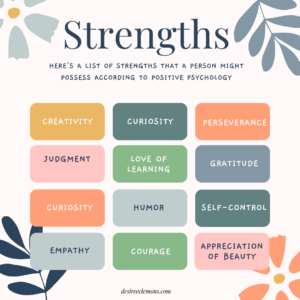
- Gratitude. Gratitude plays a pivotal role in the pursuit of happiness. It serves as a profound reminder of the positive aspects of life, even amidst challenges. When we cultivate gratitude, we train our minds to focus on what we have rather than what we lack, fostering contentment and inner peace. This shift in perspective can lead to a greater sense of happiness and well-being, as studies have shown that grateful individuals tend to experience lower levels of stress and depression while enjoying improved relationships and overall life satisfaction. Gratitude acts as a powerful antidote to the constant pursuit of more and reminds us that genuine happiness often lies in appreciating the present moment and the blessings that surround us.
- Laughter In Relationships. It should be somewhat obvious that being around people who make you feel good will ultimately improve your mood. In nurturing healthy relations, whether with friends, family, coworkers, classmates, or romantic partnerships, humor is a vital ingredient. Simply surround yourself with people who get your sense of humor. This boosts dopamine and strengthens relationships.
- Get In A Flow State. The concept of flow, as described in the Good Life part of this post, refers to a state of being fully immersed and absorbed in an activity you are skillful in. Experiencing flow can lead to feelings of happiness and fulfillment. Examples are games, activities, art, cooking, creating, and music, essentially when time stands still or just flows for you is considered flow.

- Find Meaning in Life. It is possible to find profound meaning in life when you explore your passions and interests, develop meaningful relationships, and contribute to the well-being of others. As you continually evolve and discover new dimensions of yourself, personal growth, learning, and overcoming challenges can lead to a profound sense of meaning. Finding meaning in life is a deeply personal journey shaped by unique experiences, values, and aspirations.
- Mindfulness. It’s the practice of being fully aware and attentive to the present moment without judgment. By cultivating mindfulness, you can develop greater self-awareness, which allows you to understand your thoughts, emotions, and reactions more clearly. This reduces stress, anxiety, and negative thoughts or emotions. Begin by anchoring yourself in the present moment and embrace every thought and feeling with acceptance.


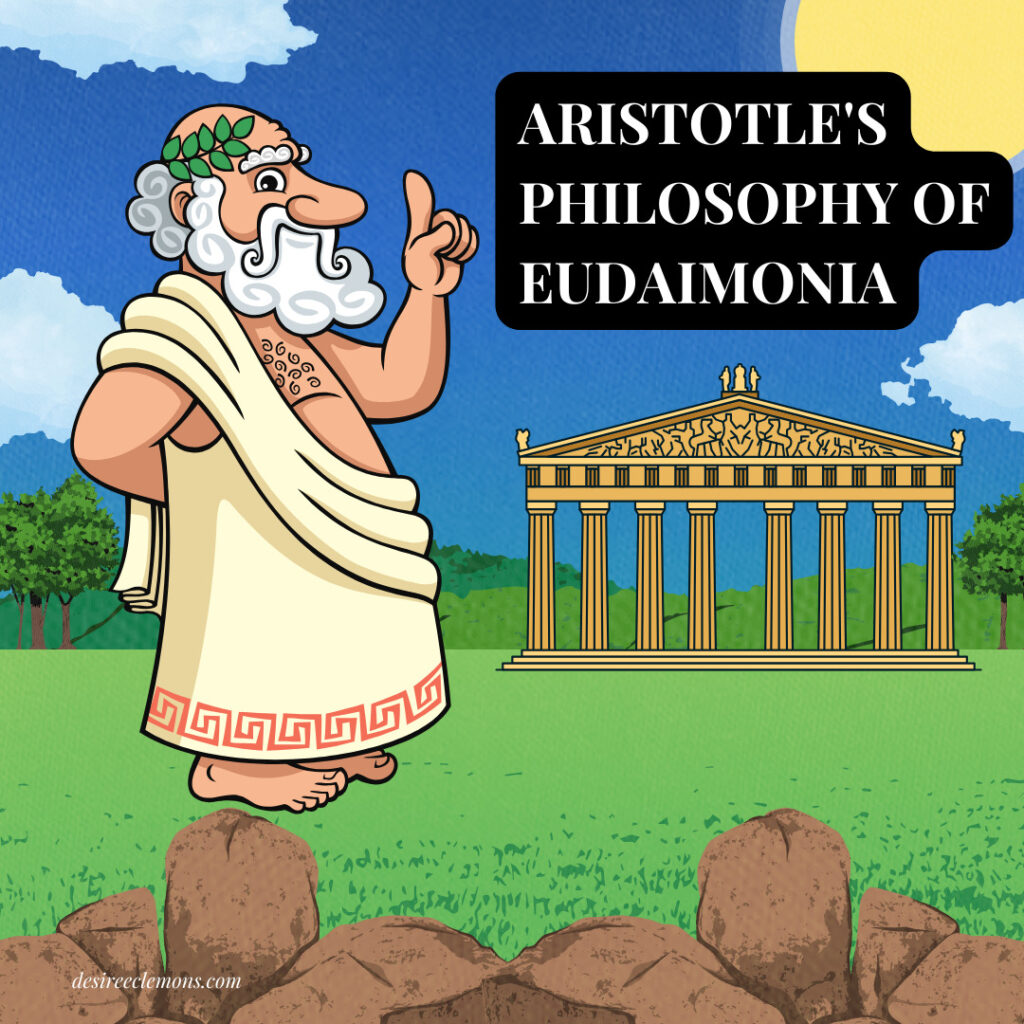


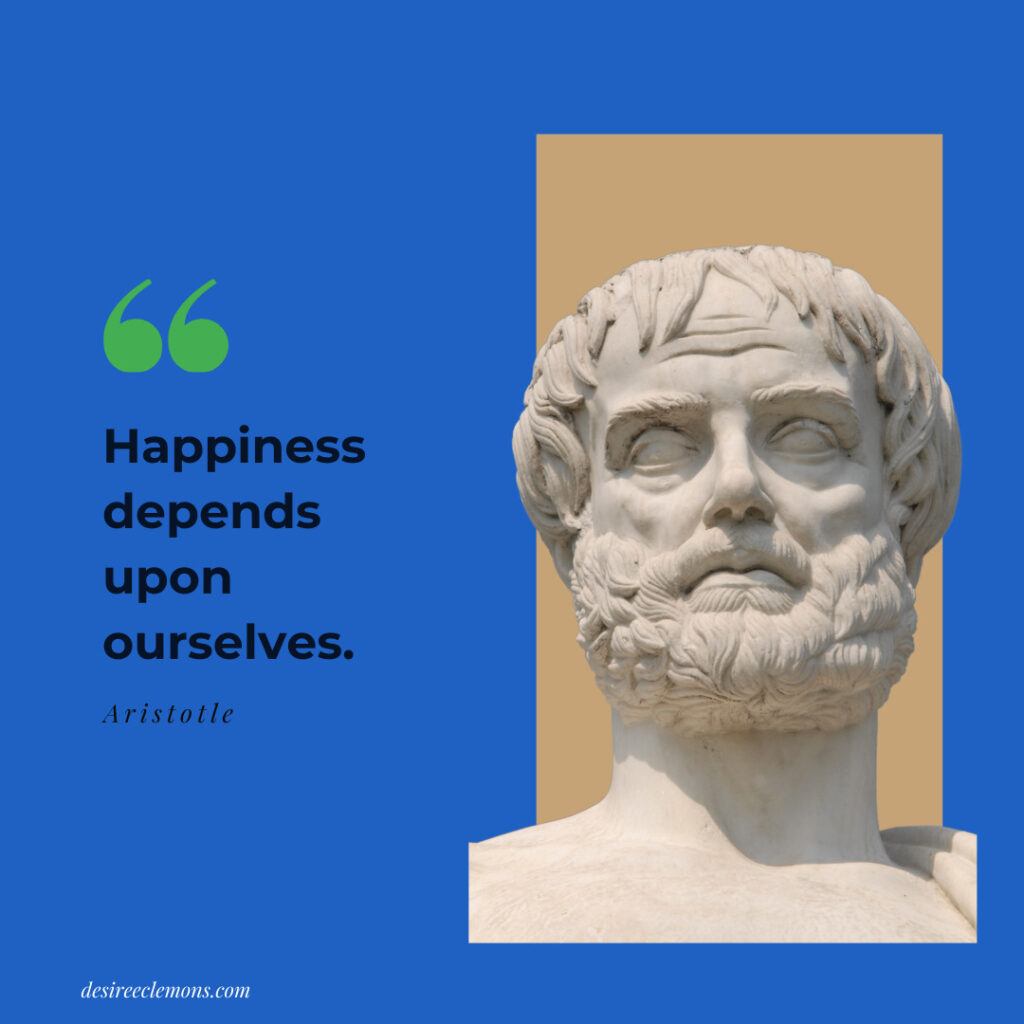
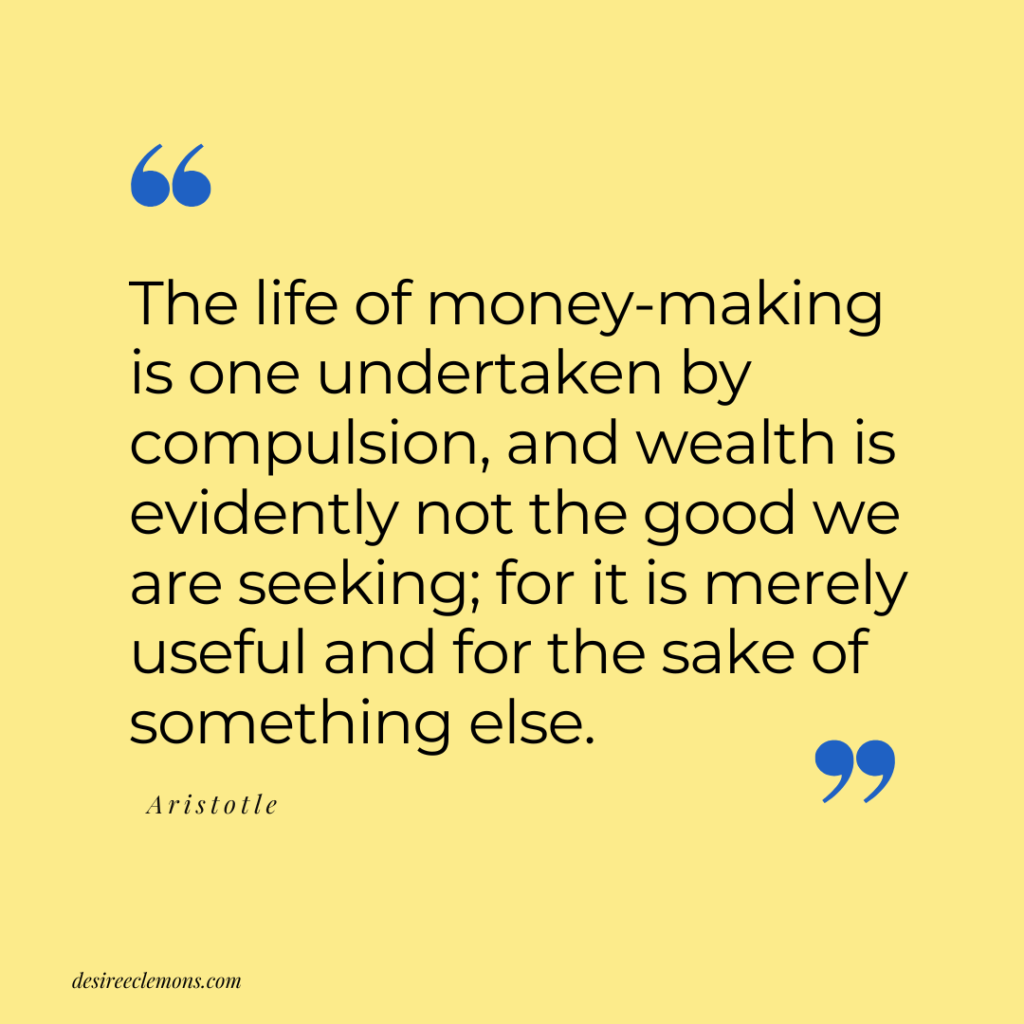
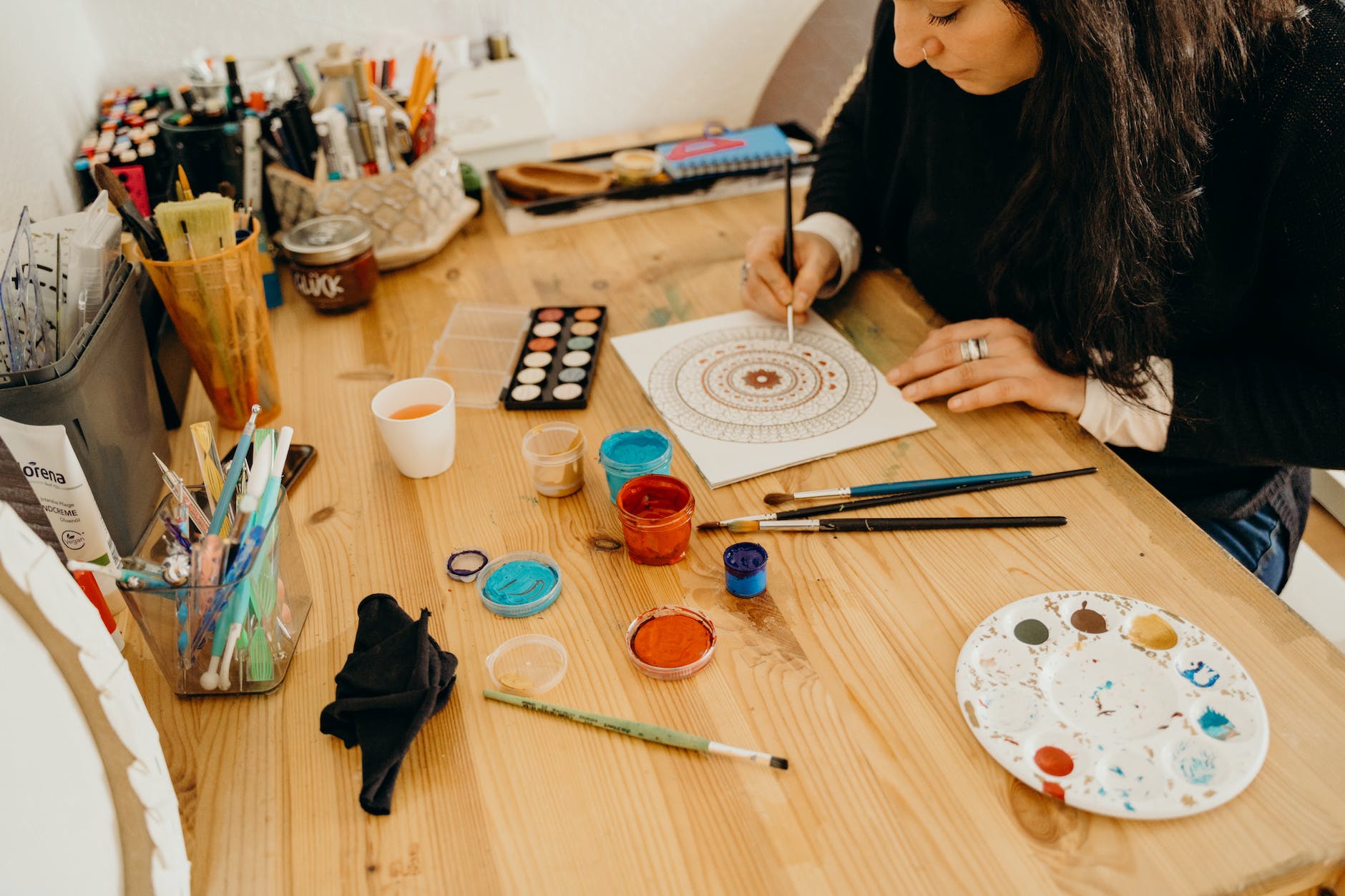

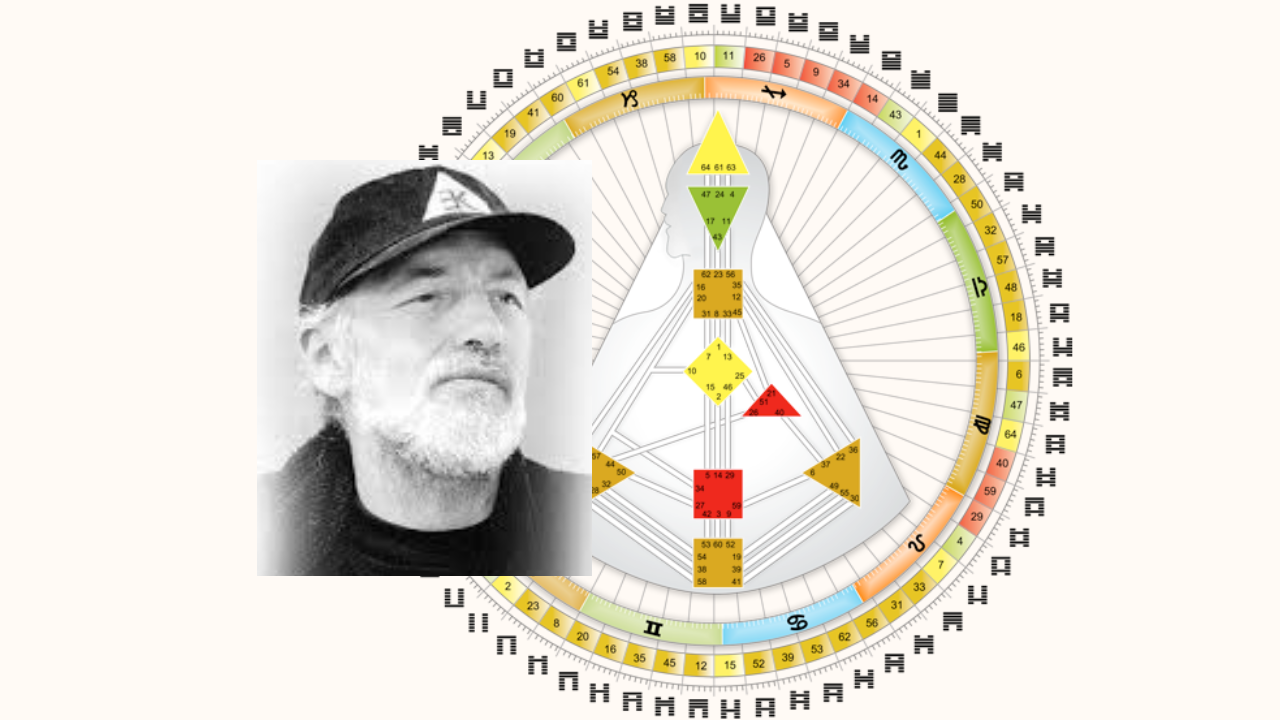



[…] if you’re interested in learning what Positive Psychology says about being happy, Read this article […]